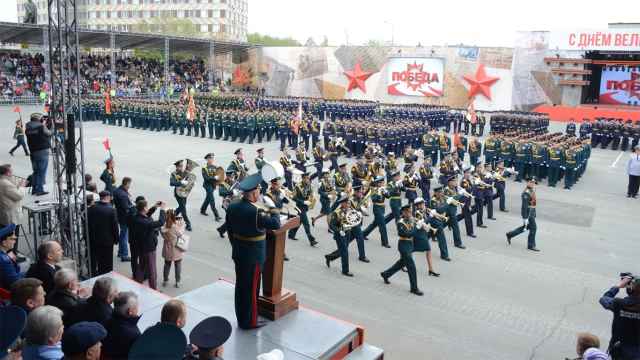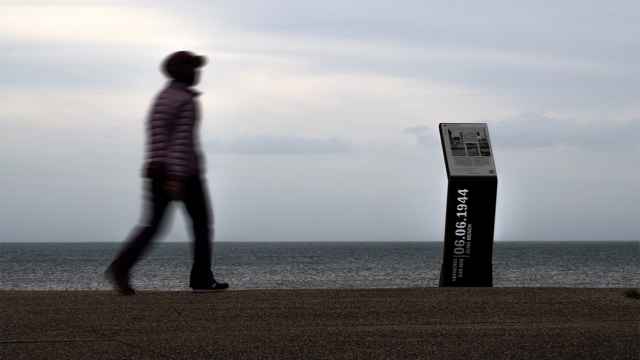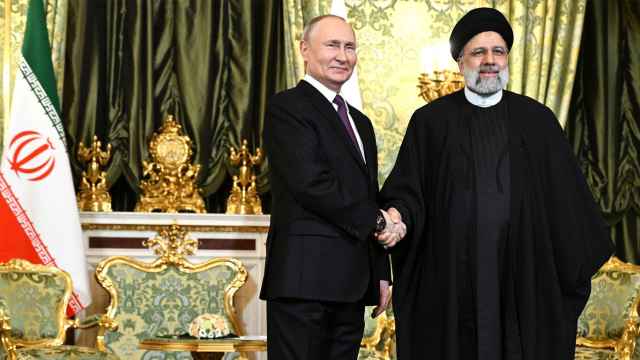A Russian state commission investigating the crash of the Fobos-Grunt Mars probe will conduct tests to see whether U.S. radar played a role in the spacecraft's failure, officials announced Tuesday.
The state commission will in the next few days bombard a ground-based object with equipment similar to the probe's with radiation equal to that which may have been emitted by U.S. radar, commission head Yuri Koptev RIA-Novosti.
"The results of the experiment will allow [us] to confirm or reject the theory about the possible impact of [U.S.] radar," Koptev said.
While some senior officials said it was possible that U.S. radar could have disabled the probe, several experts viewed the suggestion with skepticism. The United States has yet to respond to the allegations.
News of the investigation came as it was reported that the United States would launch a new space arms-control initiative drawing on a 2008 European Union draft code of conduct for space.
"The United States has decided to enter into formal consultations and negotiations with the European Union and other spacefaring nations to develop an International Code of Conduct," a U.S. official The Washington Times on condition of anonymity.
Fobos-Grunt became stranded in orbit shortly after its Nov. 9 launch. The unique unmanned probe was to bring back soil samples from the Martian moon of Phobos, following a 2 1/2 year journey.
The probe finally crashed back to Earth late Monday somewhere in the Pacific Ocean near Chile, media reports said.
Koptev said that when Fobos-Grunt made its second orbit around the Earth, five U.S. radar dishes on Kwajalein Atoll in the Marshall Islands in the Pacific were simultaneously studying an asteroid.
The atoll is home to four radar arrays built in the 1960s and 1970s and a Raytheon-built prototype from the 1990s, which "can aim at targets in space," Kommersant reported Tuesday, citing publicly available information.
Earlier Tuesday, citing "a source in the aerospace industry," Kommersant reported that the probe could have been downed by "external impact" with signals from U.S. radar as they tracked an asteroid.
"We don't rule out the possibility that the probe accidentally appeared in the zone of the impact of the radar and therefore a megawatt impulse caused a failure in the electronics," the source told Kommersant.
Afterward the craft was "unable to give the command to switch on the engine unit," the source said.
Last week, Federal Space Agency head Vladimir Popovkin suggested a possible U.S. role in the Fobos-Grunt saga, a claim Deputy Prime Minister Dmitry Rogozin repeated Tuesday.
"This theory has a right to be presented," Rogozin told a news conference, adding that if it is confirmed, he will "take all the necessary measures, including organizational and political," Interfax reported.
Rogozin on Twitter that he had taken the investigation of the probe's crash "under personal control."
In late November, Lieutenant General Nikolai Rodionov, a former Army commander in charge of preventing missile attacks, told Interfax that "the trajectory" of the probe "lay in the zone of activity of powerful American radars located in Alaska."
But Rogozin conceded that Russia's recent failures in space could be caused by "defects in equipment that was produced about 12 to 13 years ago," Interfax reported.
Since December 2010, Russia has lost five satellites and one spacecraft, including Fobos-Grunt, Newsru.com in late November.
A source in the aerospace industry Kommersant that the commission investigating the probe's crash was also checking whether "a physical failure or a short circuit in the supply system," as well as other things, could have caused the crash.
Popovkin will give his report on the cause of the Fobos-Grunt crash on Jan. 31, Rogozin said.
But some experts were skeptical about the impact of U.S. radar.
Defense expert Igor Korotchenko told The Moscow Times that should the suggestion that U.S. radar caused the probe's crash be confirmed, it would put an "end to the reset" in bilateral relations and mark "the start of a new Cold War."
"But I can hardly believe in such a version — the United States is a responsible international partner," he said.
In case of an electromagnetic impact on the probe, "the most delicate element" — the intake device of the radio transmitter — would have burned out right "at the beginning," said Alexander Zakharov, academic secretary of the Space Research Institute of the Russian Academy of Sciences.
But radio communication with the probe continued "from time to time" in the first two months after its launch, while U.S. radar could have had an effect on the probe only at the start, making it unlikely that it caused the malfunction, Zakharov told The Moscow Times.
Rene Pischel, head of the European Space Agency's Moscow Office declined to comment on the possible impact of U.S. radar.
The British Space Agency declined to comment.
The United States has long cooperated with Russia on manned space flight missions.
In 2010, NASA signed a contract to pay $55.6 million to the Federal Space Agency for each astronaut sent to the International Space Station in 2013-14.
Staff writer Alexander Bratersky contributed to this report.





